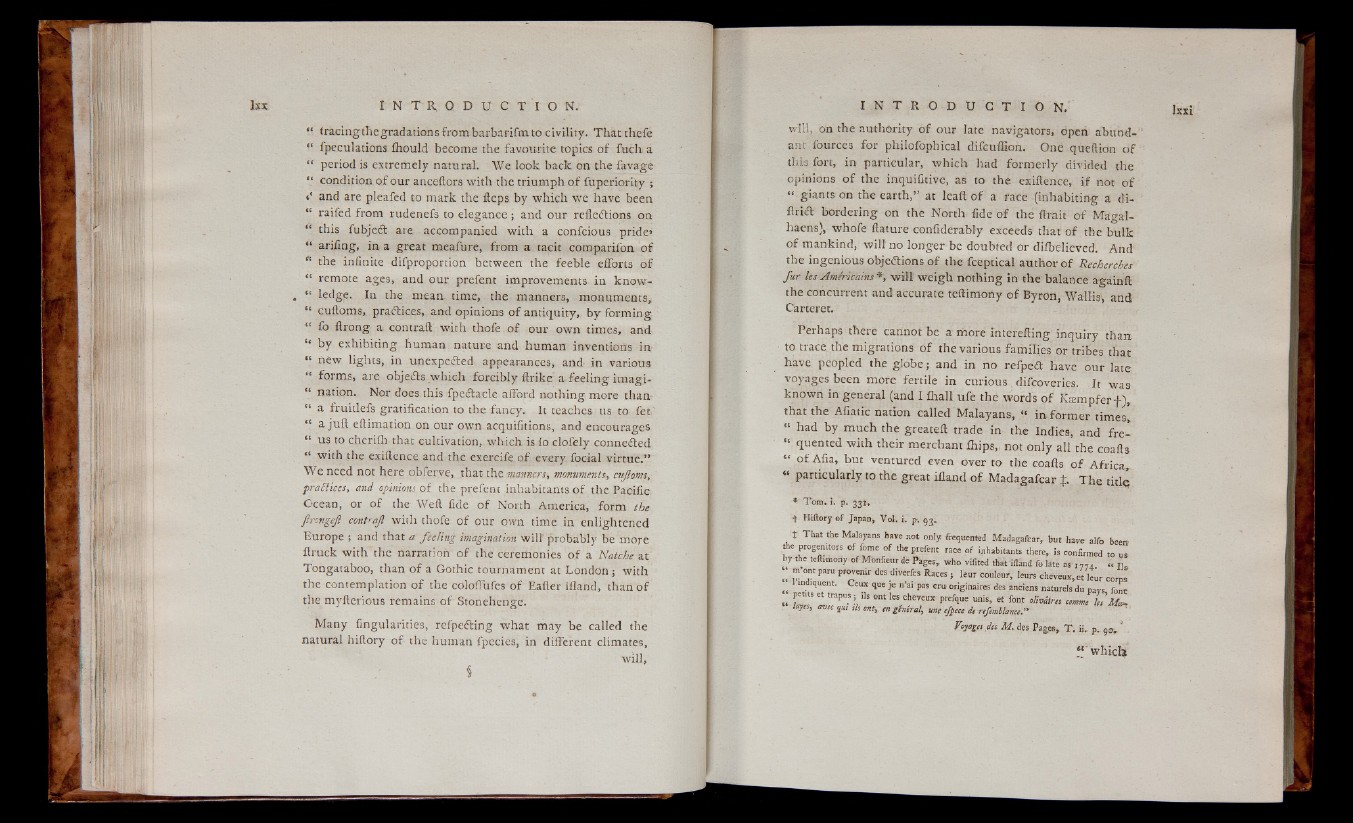
I N T R O D U C T I O N ,
“ tracing the gradation s from barbarifra to civility. Thatthefe
“ fpeculations ihould become the favourite topics of fuch a
“ period is extremely natural. We look back on the favage
3 condition of our anceftors with the triumph o f fuperiority ;
t' and are pleafed to mark the fteps by which we have been
“ raifed from rudenefs to elegance ; and our reflections on
“ this fubjeCt are accompanied with a confcious pride*
“ arifing, in, a great meafure, from a tacit companion of
f‘ the infinite difproportion between the feeble efforts of
“ remote ages, and our prefent improvements in know-
. “ ledge. In the mean time, the manners, monuments,
“ cuftoms, practices, and opinions o f antiquity, by forming
“ fo flrong a, contrail with thofe of our own times, and
“ by exhibiting human nature and human inventions in
« new lights, in unexpected appearances, and in various
% forms, are objeCts which forcibly ftrike a feeling imagi-
“ nation. Nor does this fpeCtacle afford nothing more than
“ a fruitlefs gratification to the fancy. It teaches us to fet'
jg a juft eftimation on our own acquifitions, and encourages
“ us to cherifh that cultivation, which is io clofely connected
“ with the exiftence and the exercife of every focial virtue.”
We need not here obferve, that the manners, monuments, cufloms,
praïïices, and opinions of the prefent inhabitants of the Pacific
Ocean, or of the Weft fide of North America, form the
ftrongeji contraji with thofe of our own time in enlightened
Europe ; and that a feeling imagination will" probably be more
ftruck with the narration of the ceremonies of a Natche at
Tongataboo, than of a Gothic tournament at London ; with
the contemplation of the coloffufes of Eafter lfland, than of
the myfterious remains o f Stonehenge.
Many Angularities, refpeCting what may be called the
natural hiftory o f the human fpecies, in different climates,
will,
§
I N T II O D U C T I O N. ]xxi
will, on the authority of our late navigators, open abund- "
ant fources for philofophical difcuflxon. One queftion o f
this fort, in particular, which had formerly divided the
opinions of the inquifitive, as to the exiftence, if not of
“ giants on the earth,” at leaft of a race (inhabiting a di-
ftriCt bordering on the North fide of the lirait of Magal-
haens), whofe ftature eonfiderably exceeds that of the bulk
of mankind, will no longer be doubted or diibelieved. And
the ingenious objections of the fceptical author of Recherches
fur les Américains *, will weigh nothing in the balance âgainft
the concurrent and accurate teftimony of Byron, Wallis, and
Carteret.
Perhaps there cannot be a more interefting inquiry than
to trace the migrations of the various families or tribes that
have peopled the globe ; and in no refpeCt have our late
voyages been more fertile in curious difcoveries. It was
known in general (and I fhall ufè the words of Kæmpfer f ) ,
that the Afiatic nation called Malayans, ** informer times,
« had by much the greateft trade in the Indies, and fre-
I quented with their merchant Ihips,, not only all the coafts
“ of Afia, but ventured even over to the coafts o f Africa*
« particularly to the great ifland of Madagafcar J, The title
* Tom. i. p. 331,
t Hiftory of Japan, Vol. i. p. 93.
t That the Malayans have not only ftequented Madagafcar, but have alfo been-
* e progenitors of fome o f the prefent rape of inhabitants tfiere, is confirmed to n .
by the teftimony of Monfieur de Pages, who vifited ttatifland fo late as' i 7 7 , 1 tt.
I pr0l'enir des di™ fcs R *™ i leur couleûr, leurs cheveux,et leur coros
1 indiquent. Ceux que je n’ai pas cru originaires dès anciens naturels du pavs font ;; m e t tr a p ,,.s -iis ont ies ch™x A et font layts, mec qui tls ont, en général, une eftece de refemblance.”
Voyages des M . des Pages, T . ii. p. 9o . '
*f! whiclï